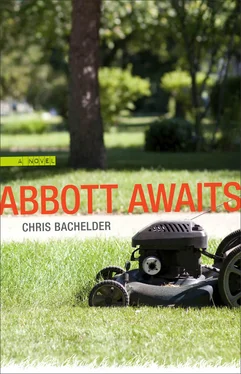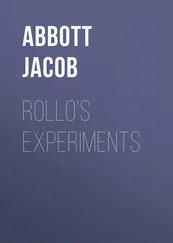9 Abbott’s Imaginary Letter to an Imaginary Nationally Syndicated Childhood and Parenting Expert
Here’s one for the Puzzled Parents mailbag. Most mornings, Abbott explains, he gets up early with his young daughter while his wife, a pregnant insomniac, tries to sleep in. He prepares breakfast for his child and then sits with her at the table while she eats. Well, it is nice time together, but the truth is that Abbott on most mornings is listless and taciturn. Sometimes — understand that it is very early and there is no nanny and he’s so tired and it seems increasingly unlikely that he will ever be consulted for a fascinating story on public radio — he has his head in his hands. The girl eats and chatters across the table while Abbott grinds his eyeballs with his palms. But occasionally, and for reasons he doesn’t understand, Abbott is fun and funny at breakfast. He makes faces and voices, he hides behind cereal boxes, he pretends to spit out bad-tasting food, he flaps his arms and flies around the table. Hold on, he’s getting to his question. Abbott’s daughter loves it when this strange father appears, though she can never depend on his appearance. Abbott is troubled by his inconsistency. He knows that a parent’s consistency is vital, that children thrive when they feel a sense of steadiness and reliability at home. His question, then, is whether he should desist with the infrequent jollity and just be consistently sullen and unresponsive at breakfast. He is Yours Sincerely, Piqued in the Valley.
10 Abbott and the Jacobite Revolts
Abbott sits on the edge of his daughter’s bed after she wakes from a long nap. The girl is happy and full of song. “My body,” she sings, clapping her hands. Her fingers are splayed and so extended as to bend slightly back, so that only her palms touch when she claps. “My body, my body,” she sings. She looks to Abbott both tiny and enormous lying beneath her sheet. She is flushed and sweaty. “Dad,” she says. “My body, my body.” Abbott does not know where she learned this song. “It does sound like body ,” he says. “It does.” His daughter sings, “My body, my body.” “It does sound like that,” he says. “But it’s Bo nn ie.” His daughter sings, “My body, my body.” Abbott says, “It does sound like that, honey, but it’s Bo nn ie. Bonnie. Bo nn ie.” His daughter says, “Dad.” “Like an nnnnnnn sound,” he says. “Bo nn ie.” His daughter claps her palms and sings a jumbled line about the sea. Abbott sings:
My Bo nn ie lies over the ocean
My Bonnie lies over the sea
My Bonnie lies over the ocean
Oh bring back my Bo nn ie to me
Abbott’s daughter says, “Be careful, Popo.” She makes her stuffed pony climb the wall. Quietly she sings, “My body, my body.”
Abbott moves to the refrain:
Bring back bring back
Oh bring back my Bonnie to me, to me
Bring back, bring back
Oh bring back my Bonnie to me
Abbott’s daughter says, “Open the window?” Abbott gets up and opens the blinds. “It’s light up,” she says. “Yes,” he says. “Sunny out,” she says, even though it clearly isn’t. Abbott commences the second verse, which he did not even know he knew until he was singing it:
Last night as I lay on my pillow
Last night as I lay on my bed
Last night as I lay on my pillow
I dreamt that my Bonnie was dead
Abbott swallows the last word. Who taught his daughter this Scottish folk song about Charles Edward Stuart (“Bonnie Prince Charlie”), who in 1745, after two decades of exile in Italy, returned to his homeland to regain the English throne for his family, only to be routed by the Redcoats and forced to escape the country disguised as a servant girl? Not that she learned it all that well, but still. He sings the chorus one more time, dramatically. He’s trying to win back his daughter’s attention because she has scrambled down the bed and is flipping through a book about a coyote. “My body, my body,” she sings. “ Nnnnnn ,” says Abbott, who in all honesty has a spotty grasp of English monarchical rule and who does not until twenty minutes later conduct Internet research on the song’s origins while ignoring the girl’s demands for grapes. “It’s about really missing a lady who is gone,” he misinforms his daughter, who is running away from him and down the hallway, “and who may have suffered some kind of misfortune on the water …” Later that night in bed, Abbott’s wife, aggrievedly not asleep, says she simply cannot stand children’s music and that she will go insane — and she really means insane — if she doesn’t cleanse from her mind this detestable song featured on one of their daughter’s new CDs. Abbott can empathize. He has had trapped in his skull for the past twenty minutes a vaguely tragic but ultimately unintelligible song called “Hinky Dinky Dee.” His wife thrashes the sheets. “Here it is,” she says. “I’m giving it to you.” She sings a frantic refrain:
My body my body
My body can do lots of things
Look at me don’t you see I can move so easily
My body my body
11 Abbott and the Highchair
Abbott is out in his driveway washing his daughter’s highchair with a hose, a sponge, and a soapy bucket. Neighbors walk by and say boy do they remember those days. They say he can wash their cars when he’s done. They say he should start a small business. The neighbors stop with their leashed dogs and tell stories of rotting fruit and yogurt beneath the seat cushions, the mysterious stenches, the revolting discoveries. Oh they don’t miss that. Abbott says these highchairs really do get disgusting. The neighbors say they literally gagged. You just don’t understand it, they say, until you have children. I know, says Abbott, it’s bad. One woman whose name Abbott thinks is Laura says her husband is taking it easy for a couple days after the vasectomy. Abbott changes the setting on his new hose attachment from SHOWER to JET, and he blasts the highchair so hard it rocks back on two plastic wheels. Desiccated raisins fly like shrapnel. A small, personal rainbow glistens in the mist at the face of the new hose attachment.
Like many others before him, Abbott discovers, once married, that marriage is a battle — clinically, a negotiation —over the possession of the Bad Mood. A marriage, especially a marriage with children, cannot function properly if both its constituents are in foul temper, thus the Bad Mood is a privilege only one spouse can enjoy at a time. Who gets to be in a Bad Mood? This is the day-to-day struggle. In the Perfect Union, the Bad Mood is traded equitably, like child care or household chores. There is joint custody of the Bad Mood. If one spouse is grumpy for an entire weekend, the other spouse might take the Mood for the workweek. If one spouse is low-spirited during that unpleasant stretch from Christmas to the New Year, the other spouse might claim Thanksgiving, Easter, and the Fourth of July. In the typical marriage, however, one spouse tends to possess the Bad Mood disproportionately. This is called Hogging the Mood. Abbott peacefully acquired his wife’s Bad Mood in a long line at the Big Y during a late afternoon last February, a Thursday, and he has not given it up in four months. It is a testament to his wife’s good nature that she did not, initially, try to reclaim the Mood, as she had every right to do. She is pregnant, after all, and sleeping poorly. For the first few weeks, even a month, she let Abbott have it, no questions asked. Like a friendly librarian, she has always had a lenient overdue policy, and besides, Abbott suspects they have a tacit understanding that he requires the Bad Mood slightly more than she does. Although they have never kept a record — at least he hasn’t — he is reasonably certain that he has been majority owner of the Bad Mood during the marriage. Also, he supposes that she imagines there will be some attractive mood compensation package for her patience and goodwill. But as the weeks and months pass, Abbott senses that she is growing anxious to repossess the Bad Mood. She tries sex, and she tries withholding sex. She tries lighthearted humor and then lighthearted threat. We can, she says, do this the hard way or the easy way. She says broken kneecaps. Eventually she employs guerrilla tactics, surprise raids, quick and deep mood plunges designed to buoy Abbott’s mood and achieve marital equilibrium. But he holds fast. He wants the Bad Mood — he feels he needs it — and giving it up after holding it so long begins to seem arbitrary. He has had it this long — why cede it now? Many times he feels himself veering close to enjoyment or contentment, but then, realizing the risk, he retreats to the center of the Mood. And then this afternoon Abbott returns home from the hardware store and sees his young daughter running out to the driveway to meet him. She says “Dad” over and over again, grabs his leg like a child in an advertisement for life insurance or home mortgage. She smiles up at him, jumping, chanting “Dad,” as if he has been a good father. Abbott kneels to pick her up. He puts his arms around her neck and whispers something affectionate into her ear. Her curly hair tickles his face. When he looks up, he sees his wife watching them from the kitchen window, and that’s when he loses it.
Читать дальше












